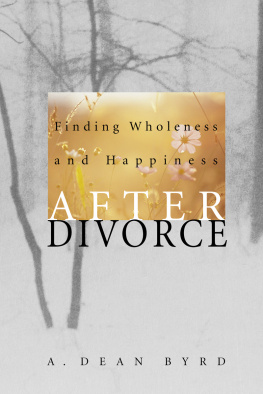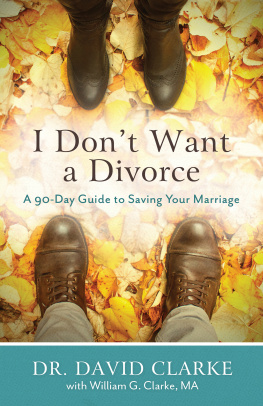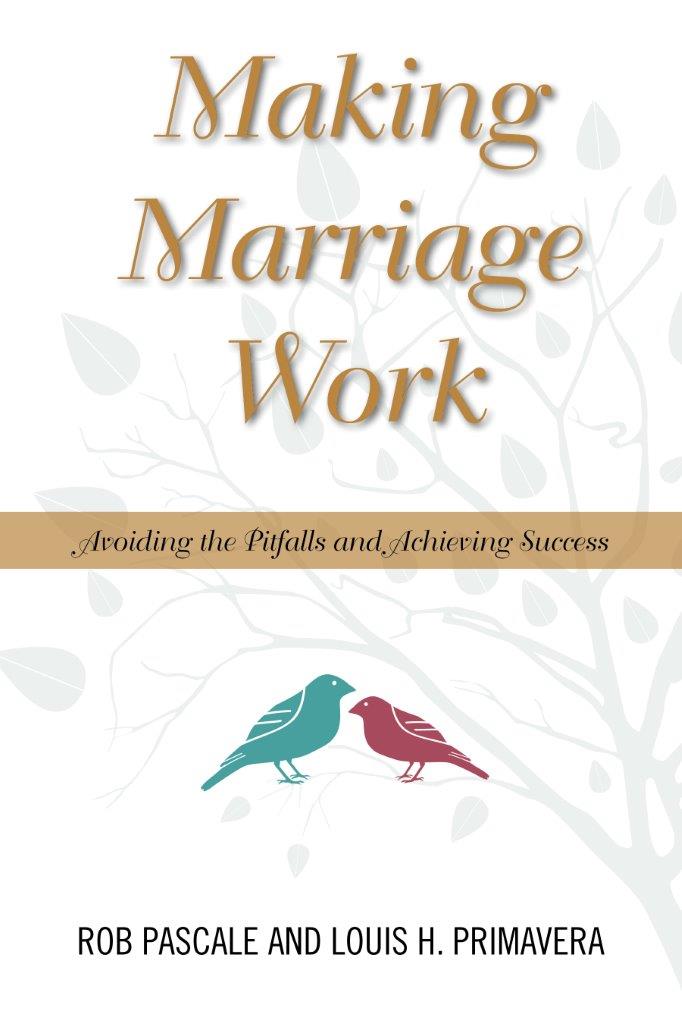Making Marriage Work
Making Marriage Work
Avoiding the Pitfalls
and Achieving Success
Rob Pascale and Louis H. Primavera
ROWMAN & LITTLEFIELD
Lanham Boulder New York London
Published by Rowman & Littlefield
A wholly owned subsidiary of The Rowman & Littlefield Publishing Group, Inc.
4501 Forbes Boulevard, Suite 200, Lanham, Maryland 20706
www.rowman.com
Unit A, Whitacre Mews, 26-34 Stannary Street, London SE11 4AB
Copyright 2016 by Rowman & Littlefield
All rights reserved. No part of this book may be reproduced in any form or by any electronic or mechanical means, including information storage and retrieval systems, without written permission from the publisher, except by a reviewer who may quote passages in a review.
British Library Cataloguing in Publication Information Available
Library of Congress Cataloging-in-Publication Data
Names: Pascale, Rob, 1954- | Primavera, Louis H., 1943
Title: Making marriage work : avoiding the pitfalls and achieving success /
Rob Pascale, Louis H. Primavera.
Description: Lanham : Rowman & Littlefield, 2016. | Includes bibliographical
references and index.
Identifiers: LCCN 2015030327| ISBN 9781442256972 (cloth : alk. paper) | ISBN
9781442256989 (electronic)
Subjects: LCSH: Marriage. | Communication in marriage.
Classification: LCC HQ734 .P9197 2016 | DDC 306.81--dc23 LC record available at http://lccn.loc.gov/2015030327
 TM The paper used in this publication meets the minimum requirements of American National Standard for Information Sciences Permanence of Paper for Printed Library Materials, ANSI/NISO Z39.48-1992.
TM The paper used in this publication meets the minimum requirements of American National Standard for Information Sciences Permanence of Paper for Printed Library Materials, ANSI/NISO Z39.48-1992.
Printed in the United States of America
To our wives, Lynne Pascale and Anne Primavera,
for their many years of tolerance, patience,
understanding, and affection
as well as their outstanding editing.
Chapter 1
Introduction
Mark and Judy had been married about eighteen years and wanted to find out if counseling could improve their marriage. During the initial sessions, I asked a lot of questions about their relationship to uncover what might be at the heart of their issues. As we met over the following weeks, both claimed there wasnt a specific problem that kept cropping up. In fact, they said they almost never argued. However, they also rarely engaged in any forms of intimacy. Their broader issuesthat is, what was causing their lack of intimacyremained very much under the surface.
One day Mark arrived before Judy and told me that going to therapy was Judys idea. From his perspective, he was just going through the motions. He already had a girlfriend and was really just working out the best time to leave. He believed his marriage was too far gone, and regardless, he had no interest in fixing it. Therapy for him was a way to end their relationship, not a way to repair it. Judy, on the other hand, was committed to turning things around and was completely unaware of Marks intentions.
A lot of couples come to marriage counselors to get permission to leave. One or the other has already made up their minds before the first session, and going to therapy makes it look as though they tried, but its a way to alleviate their guilt. Whats truly unfortunate is that many of their problems could have been solved, and if they dont try, they might end up facing many of the same issues in future relationships.
Marriage as an institution seems to be at risk, or at least thats what recent statistics suggest. At present, somewhere between 35 percent and 50 percent of marriages are expected to end in divorce at some point, and only about seven out of ten couples will make it to their tenth anniversary. Additionally, young people are not flocking to marriage the way they used to. While getting married in the past was something of a rite of passage into adulthood, people today are waiting longer to get married. More couples also seem to regard living together outside of wedlock as a better way to go, possibly because its less complicated, less restricting, or just less scary because the door is always a little open.
For some contemplating marriage, such statistics and social trends can be downright depressing. They suggest that, despite how hard we worked to find the right person, we dont have a very good chance of long-term success. Others may take a more cynical perspective. Having grown up with friends living in single-parent households or experiencing that arrangement themselves, they may expect their own marriages to fail. Either way, its not unreasonable to question whether taking that step makes sense. Maybe the institution is obsolete and no longer relevant to the way we live now.
That, of course, is not the case. Being married is still how people prefer to live, and within all cultures its one of the most valued institutions. Most of us eventually end up married at least once in our lifetimes, and rare is the totally committed bachelor or bachelorette. Its predominance in our individual and social psyches is demonstrated by how much press the subject receives. As of this writing, an online search of library abstracts cites more than forty thousand scientific articles just from the fields of psychology and sociology, and the Amazon.com website lists more than nine thousand books on how to make your marriage better.
But if marriage is so cherished and so culturally ingrained, why are couples more likely today to end up divorced? From our perspective, what the statistics actually reveal is not that marriage isnt valued, but that its much harder today to keep one intact. Theres evidence, for example, that relationships have more conflicts nowadays. Thats not to say that marriages were happier years ago. The truth is there was probably a lot of suffering in silence. Yet these couples stayed married, mostly because there wasnt much choice if you wanted to be accepted in the community. However, those in the Baby Boomer and later generations have had to marry in the face of social changes that have made it much easier to walk away.
One factor that has worked against the stability of the institution is the adoption of no-fault laws in the late 1960s. As a result of such legislation, couples no longer need to explain why they are divorcing. A marriage can be dissolved for any reason or no reason at all. However, as an unintended consequence, the government has actually helped to legitimize divorce. These laws are an acknowledgment by the state that breaking up a marriage is acceptable and the reasons for doing so is nobodys business. In effect they have removed the negative stigma, so couples can split up and still retain their standing in the community.
Then theres the womens movement. Women now have more and better employment opportunities and are more in control over their own lives. Although their salaries lag behind those of men, a job still provides them with a good amount of independence, and they no longer require a husband for financial security. So they can now wait longer to get married, and dont have to stay married if theyre not satisfied with their partner. Without feeling trapped in bad marriages, women may have less of a need to work through marital problems because theyre better equipped to make it on their own.
Along with greater equality, the roles held by men and women are no longer clearly delineated. As a result, theres been a reduction in interdependency. Before the 1960s, husbands and wives held complementary roles. One was the breadwinner, providing safety and financial security for the family; the other was responsible for maintaining the home, raising children, and fulfilling other social and family duties. Because each partner filled a specific and highly defined role, couples had functionally different and very useful reasons for staying together. In contrast, today theres a good deal of overlap in terms of who brings home the bacon and who manages the household. The blurring of roles means each partner doesnt provide to the other a unique set of benefits that they did in past generations, which weakens the need to stay together.
Next page





 TM The paper used in this publication meets the minimum requirements of American National Standard for Information Sciences Permanence of Paper for Printed Library Materials, ANSI/NISO Z39.48-1992.
TM The paper used in this publication meets the minimum requirements of American National Standard for Information Sciences Permanence of Paper for Printed Library Materials, ANSI/NISO Z39.48-1992.